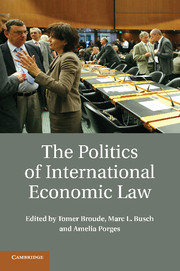Book contents
- Frontmatter
- Contents
- Contributor List
- Acknowledgments
- 1 Introduction
- Part I The Politics of Law Making in International Trade
- Part II The Politics of International Investment Treaty Making
- Part III The Politics of Sovereign Wealth and International Financial Law
- Part IV The Politics of Dispute Settlement in International Economic Law
- Part V Linkages between International Economic Law and Foreign Policy
- 13 The Politics of Rules of Origin
- 14 The Politics of Divestment
- Index
- References
13 - The Politics of Rules of Origin
Published online by Cambridge University Press: 03 May 2011
- Frontmatter
- Contents
- Contributor List
- Acknowledgments
- 1 Introduction
- Part I The Politics of Law Making in International Trade
- Part II The Politics of International Investment Treaty Making
- Part III The Politics of Sovereign Wealth and International Financial Law
- Part IV The Politics of Dispute Settlement in International Economic Law
- Part V Linkages between International Economic Law and Foreign Policy
- 13 The Politics of Rules of Origin
- 14 The Politics of Divestment
- Index
- References
Summary
INTRODUCTION
The political economy literature of international trade posits that external trade policies are closely linked with domestic and foreign political processes. Rules of origin (ROOs) aim to determine whether a particular trade concession (e.g., duty-free import) will be applied to a given product in international trade. Certain features of ROOs make them particularly susceptible for employment as an instrument of foreign and domestic policies.
The increasing political employment of ROOs was one of the principal factors leading to the inclusion of this topic in the Uruguay Round agenda and the formulation of the 1994 World Trade Organization (WTO) Agreement on Rules of Origin. As elaborated in the subsequent text, that initial agreement is not effectively coping with the widening political employment of ROOs. This chapter analyzes the political utilization of ROOs and offers some proposals to strengthen future agreement in this sphere.
RULES OF ORIGIN: MAJOR AIMS AND KEY PRINCIPLES
Rules of origin primarily serve as a differentiating mechanism for distinguishing between products according to their place of production. These rules are indispensable for the operation of international trade regimes that promote liberalization on a reciprocal basis. Under the WTO agreements, as well as bilateral and regional trade agreements (RTAs), trade concessions are granted only to products manufactured in states that undertake to grant concessions to products of other contracting states.
- Type
- Chapter
- Information
- The Politics of International Economic Law , pp. 317 - 336Publisher: Cambridge University PressPrint publication year: 2011
References
- 1
- Cited by



